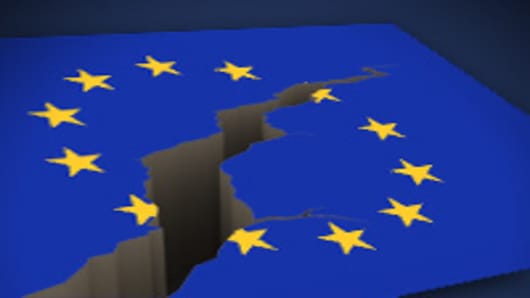On Friday, as data from China and the U.S. showed the global economy slowing sharply, the head of the World Bank warned that the summer of 2012 is looking like an “eerie” echo of 2008, when a collapse of the U.S. mortgage market led to the collapse of Lehman Brothers.
It’s difficult to argue with him, following a huge selloff in oil prices, something we saw happen before the collapse of Lehman Brothers. Having traded well above $100 a barrel just a few weeks ago, crude prices are now fast approaching $80 a barrel, as a lack of confidence in the global economy and fears over Europe and its banking sector weigh on sentiment.
Having performed well until May, stocks are now under heavy pressure and expected to fall further on Monday as investors second guess how the politicians and policy makers will respond to the renewed sense of crisis.
Billionaire investor George Soros says there are only three months to save the euro and warned over the weekend that the European Central Bank and Berlin will not act in time to stop the collapse of the single currency in its current form. A quick look at CNBC’s June diary would indicate that policymakers have only four weeks to come up with what the German press are now calling an European Union master plan.
On June 17, Greece goes to the polls and could elect an anti-austerity coalition led by the hard-left Syriza, which is threatening to reject Greece’s previously agreed upon bailout, something which some believe could lead to a so-called “Grexit.”
Spain, which has seen the cost of its long-term borrowing soar in recent weeks, is a major concern following the nationalization of mortgage lender Bankia . Despite numerous denials, reports indicate that Germany now wants Madrid to accept European assistance for its banks and market participants are questioning if the country deemed too “big to bail” will in fact be bailed out after all.
EU leaders will meet at the end of the month in Brussels, by which time it will be a lot clearer whether Europe is heading toward fiscal union, or one or more members of the euro will be forced to leave the single currency. It takes a brave investor to bet on either outcome.
“The sidelines are the only place to be, and gold could do well,” Dennis Gartman, the author of the Gartman Letter told CNBC’s “Capital Connection” on Monday. “Be in cash and be on the side lines.”
For those willing to take on the risk in the hope of big rewards they have to take a bet on Europe’s determination to backstop the euro and its struggling members on the periphery.
In May, Angela Merkel made it clear in an interview with CNBC that she stands behind Greece and wants it to remain in the euro. It does, though, remain unclear whether she will stand behind Athens if voters reject the austerity plan she demands is adhered to if Greece wants assistance from the EU.
Over the weekend, reports indicated that Germany is now willing to consider greater fiscal union if euro members agree to hand over power on government spending and structural reform of their economies. Officials in Brussels, Frankfurt, and Berlin are said to be working on a “master plan” that could see Germany agree to underwrite the euro if everyone falls into line on German demands for fiscal responsibility.
"The fundamental question is relatively simple. Do our partners really want more Europe, or do they just want more German money?" a government official in Berlin told Reuters on Sunday.
The problem is that this debate is only just beginning and, as Soros points out, could take time to be agreed upon. With investor sentiment so weak, the ECBmay need to act in order to give the politicians the time they need to agree upon what would ultimately lead to a United States of Europe.
“We expect the ECB to announce further (long-term refinancing operations)at this week’s policy meeting as insurance against a potential intensification of deposit flight,” said Piero Ghezzi, the head of economics at Barclays investment banking arm, in a research note.
“The Spanish banking crisis is likely to result in a further step towards a more federal Europe.A banking union accompanied by a supra-national banking supervisory body has been a long-standing item on the ECB’s wish list and is now openly being discussed,” said Ghezzi.
As my colleague Catherine Boyle wrote last week, Europe is may be entering the intervention zone, but with investors in risk-off mode, the timing of any intervention is crucial.
“The European leadership is working feverishly on the necessary fundamental changes — while the ECB no doubt stands ready with the fire hose if anything goes wrong in the meantime. [European Council President Herman] Van Rompuy and [ECB President Mario] Draghi are working on the architectural question with a view to report to the summit at the end of the month” Erik Nielsen, global chief economist at Unicredit, said on Sunday.
“Meanwhile, the ECB surely stands ready in case there is an accident — and the risk of that happening has clearly increased with the Greek uncertainties and the fumbling in Madrid. I don’t think Wednesday’s ECB meeting will reveal much in this respect,” said Nielson. “The world is not coming to an end; rather, it feels as if we are on the doorstep to another major European integration move — but why do these initiatives only come when we are on the edge of the cliff, where the risk of an accident is so much higher?”



